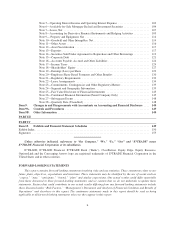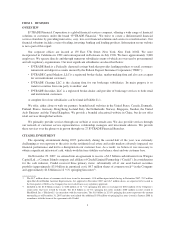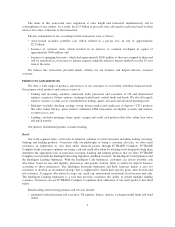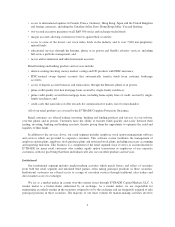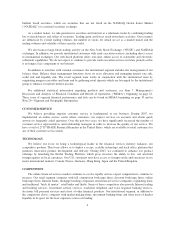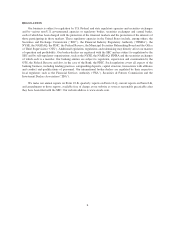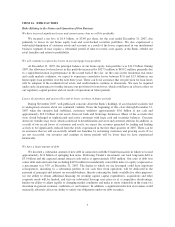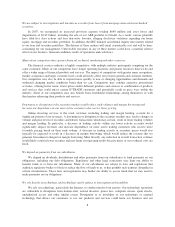eTrade 2007 Annual Report Download - page 13
Download and view the complete annual report
Please find page 13 of the 2007 eTrade annual report below. You can navigate through the pages in the report by either clicking on the pages listed below, or by using the keyword search tool below to find specific information within the annual report.Risks associated with principal trading transactions could result in trading losses
A majority of our market-making revenues are derived from trading as a principal. We may incur trading
losses relating to the purchase, sale or short sale of securities for our own account, as well as trading losses in our
market maker stocks. From time to time, we may have large positions in securities of a single issuer or issuers
engaged in a specific industry. Sudden changes in the value of these positions could impact our financial results.
Reduced grants by companies of employee stock options could adversely affect our results of operations
We are a provider of stock plan administration and options management tools, and our revenue from these
tools depends in part on the size and complexity of our customers’ employee stock option and stock purchase
plans. In December 2004, the Financial Accounting Standards Board (“FASB”) issued Statement of Financial
Accounting Standard (“SFAS”) No. 123(R), Share-Based Payment, which among other things required public
companies to expense employee stock options and other share-based payments at their fair value when issued.
SFAS No. 123(R) may result in companies granting fewer employee options and modifying their existing
employee stock purchase plans, potentially reducing the amount of products and services we provide these
companies and compelling us to incur additional costs so that our tools comply with the FASB statement.
Additionally, we may see a reduction in commission revenues as fewer employee stock options would be
available for exercise and sale by the employees of these companies.
Reduced spreads in securities pricing, levels of trading activity and trading through market makers could harm
our market maker business
Computer-generated buy/sell programs and other technological advances and regulatory changes in the
marketplace may continue to tighten securities spreads. Tighter spreads could reduce revenue capture per share
by our market makers, thus reducing revenues for this line of business.
Advisory services subject us to additional risks
We provide advisory services to investors to aid them in their decision making and also provide full service
portfolio management. Investment decisions and suggestions are based on publicly available documents and
communications with investors regarding investment preferences and risk tolerances. Publicly available
documents may be inaccurate and misleading resulting in recommendations or transactions that are inconsistent
with the investors’ intended results. In addition, advisors may not understand investor needs or risk tolerances,
failures that may result in the recommendation or purchase of a portfolio of assets that may not be suitable for the
investor. To the extent that we fail to know our customers or improperly advised them, we could be found liable
for losses suffered by such customers, which could harm our reputation and business.
Our international efforts subject us to additional risks and regulation, which could impair our business growth
One component of our strategy has been an effort to build an international business, sometimes through
joint venture and/or licensee relationships. We have limited control over the management and direction of these
venture partners and/or licensees, and their action or inaction, including their failure to follow proper practices
with respect to regulatory compliance and/or corporate governance, could harm our operations and/or our
reputation.
We have a significant deferred tax asset and cannot assure it will be fully realized
The Company has net deferred tax assets of $550 million as of December 31, 2007. While the Company has
concluded that as of December 31, 2007 it is more likely than not that the net deferred tax assets will be realized,
we cannot assure that such deferred tax assets will be realized. The ability to realize these net deferred tax assets
is primarily based on the Company’s generation of taxable income in future years, which cannot be assured. In
10


